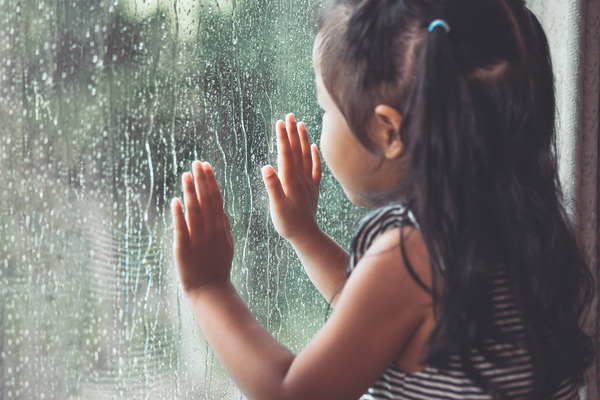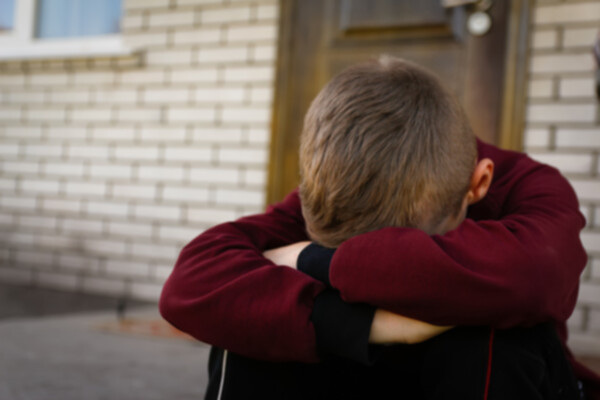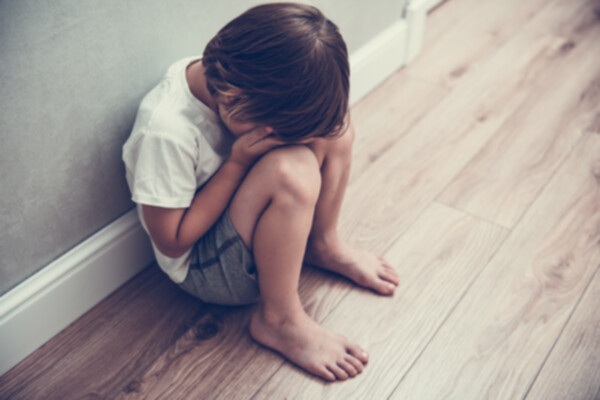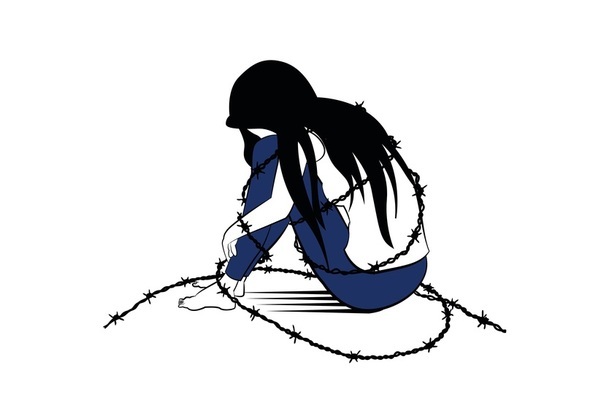What can we do when our children are experiencing grief? How to deal with this situation? Discover how to help them overcome grief.

Most people understand grief as a process through which the person must learn to adapt to new life without the presence of their deceased loved one. However, grief can occur in circumstances such as a separation, change of residence, loss of friends, breakup or any sudden change that occurs in her life and requires adaptation. In the case of the death of a loved one, grief involves intense emotional pain. But how do they suffer children mourn?
Grief in children: How do children react to death?
The reactions that a person may experience when faced with the pain of losing a loved one are normal in the face of a painful, intense and infrequent situation. Children can notice changes that occur in their environment. However, the extent of your true understanding of what is happening will depend on the cognitive and emotional development associated with age. Reactions can be grouped, in general, into physical, behavioral, emotional and cognitive symptoms.
- Physical reactions: tiredness, lack of energy, hyperactivity, change in appetite, sleepiness, headaches, stomachaches, etc.
- Behavioral reactions: a regression to previous stages can be observed. For example, talking like a baby, asking for a bottle, pacifier, stopping toilet training, etc.
- Emotional reactions: irritability, sadness, loneliness, insensitive to what surrounds you, mood swings, disinterest in peers, etc.
- Cognitive reactions: worry about the possible death of another loved one, fear of being left alone, of being abandoned again, etc.
In the way of expressing pain, each child It is unique and your adaptation process will be too. Even so, there are certain differences in grief responses depending on the age of the child:
- Up to 3 years: At this age, children have a total lack of understanding of death and show indifference to it. However, they do perceive changes in the environment and they do experience that their loved one, mother or father, does not respond to their requests or calls. In this absence, the child may regress in the developmental stages, become more dependent, cry more, and be more irritable.
- 3 to 5 years: Children know that something has happened that their loved one is not there, but they understand it as something reversible so they will ask about them and look for the loved one. It is likely that they consider themselves the cause of death or that they have done something wrong and have been punished. They can also return to previous evolutionary stages (thumb sucking, wanting to drink all the time, asking for a bottle, losing sphincter control, for example). They may also show a certain ambivalence; they may seem to understand what has happened and then ask when their loved one will return.
- From 6 to 9 years: In this age group, a more realistic concept of what it means to die begins to be created. They begin to understand that it is irreversible and associate it with objects such as the coffin, corpse, etc.
- From 10 to 12 years: From this age onwards, their concept of death is more similar to that of adults. They understand that it is something that can happen to anyone, it is inevitable and irreversible, which can cause distress in minors.
- Adolescence: It is more similar to the adult’s conception of death. The understanding that death is something that can happen to anyone and is not reversible can be denied by carrying out risky behaviors, actions or provocations.

How do we tell the minor what happened?
The vast majority of professionals and expert authors on the subject agree that the best option is for the bad news to be communicated to a child by a close loved one, trusted by the child. It is also recommended that it be as soon as possible, in a place known to him, where he feels comfortable and a moment planned calmly.
- It is a time when we should not be in a hurry to go somewhere else, it is better to have plenty of time to be there as long as they need.
- It is preferable to make an introduction, not start with the news. For example, “We are here, we come, we have to tell you something important…”
- It is also preferred to use clear, unambiguous language and avoid the use of fantasy stories and link it to life events that are reversible, such as a dream or a trip. As well as not lying or avoiding talking about the subject.
- Children realize and perceive that something has happened that has changed their lives. We must find the balance between telling the truth and loading the news with excess realism. There will be occasions where the details of the death can be somewhat gruesome, delicate.
- Something that is very useful is, if a pet or someone you know has died in the past, collect this experience to use it as an example and promote the child’s understanding.
- It is important to give space, respect and validate the child’s response, whatever it may be. People can react to bad news by not accepting it, aggression, guilt, overwhelming interest for the person giving the news, crying or acting as if they had not heard anything. They are mechanisms that the body has to protect itself from suffering. We must be patient and make ourselves available when they are ready to talk about the topic.
At this point it is important to keep in mind that the objective is to communicate that our loved one has died and will not return, that it is something painful and we know it, that we will be with him or her for whatever they need, that we love them and will continue to love them. mostly.
How to help children grieve?
Many parents or adult caregivers wonder what they should do to support, help, accompany that minor who has lost their father, mother, grandmother, brother, etc. It is a period where, while we overcome grief, we want to help it do so in the healthiest way possible and this can overwhelm us emotionally.
First of all, clarify that for the emotional, social, psychosexual and cognitive development of children towards adulthood to be as healthy as possible, it is necessary that they live a warm, safe, affective, individualized and continuous experience of care from the caregivers. to interact with them.
First of all, be available, offer company and affection. If the deceased is a loved one, they are likely to feel abandoned. One way to reduce this feeling is by encouraging pleasant interactions with them, covering their basic needs and demonstrating our closeness. All this will offer a feeling of security to the minor.

The first days of death can disturb, to a greater or lesser extent, the time structure of the family or child and it is something that happens with minors and adults. As soon as possible, it is advisable to return to your daily routine. This offers, again, an environment of security and a feeling of control. Changes that involve more adaptive processes, such as going to school or acquiring new responsibilities, may have to be postponed.
As we have said before, the reaction to bad news can be different depending on the person and it is important to give space for the person to express their emotions. This applies to both the adult and the minor and it is important to validate and accept that each person feels an emotion different from ours. Perhaps the father feels sadness over the death of his wife and the child feels sadness and anger over the death of his mother. There is no benefit in hiding how we feel from children, or telling them not to cry. If adults show their emotions in front of children, it can help them understand that they are also allowed to feel what they are feeling and can express it.
How long does grief last in children? How do we know they have overcome it?
Grief is a process that helps us understand what has happened and learn to adopt a new lifestyle. It is a process, so overcoming it will not happen overnight. It is something progressive that depends on the type of bond with the deceased person, the age of the child, the type of death, among others.
The authors agree that to affirm that a child has grieved, it is necessary for him or her to understand that death is irreversible, he or she is not the cause of death, and to remember it without being invaded by negative emotions.
As in adults, the grieving process can stagnate, not be adequately processed, and pathological grieving may appear. We will realize this because the reactions mentioned at the beginning may reappear along with others that we explain below:
- Regression of past evolutionary phases is not overcome, such as excessive crying, frequent tantrums, requests for a bottle, pacifier, etc.
- Intense fear of separation from the primary adult caregiver or of being left alone.
- Nightmares, problems with sleep.
- Problems in different areas: poor school performance, behavioral problems, rebellion, etc.
- Physical symptoms such as headaches, stomachaches.
It is good to be able to facilitate everything that favors the processing of grief. Drawings, games, and making photo albums encourage the expression of feelings as they feel them. We can accompany them and ask them what they have drawn.
Stories are a fabulous tool to talk about death. There are stories prepared by psychology experts for adults and children to work on the death of a loved one. With stories you can talk about the characters, the story, and the similarities with your situation.
It is important to take into account whether the minor is ready, is prepared to speak, to immerse himself in the emotions that lead him to mourn or if it is our haste and anxiety to overcome the grief because we suffer when we see it.
- Promoting interactions, activities and pleasant moments strengthens the bond.
- Establishing your daily routine promotes a feeling of security.
- Providing space and time for everyone’s feelings to be expressed, appearing close and accessible increases security, the feeling of being heard, understood and loved by their close caregivers.
If the primary caregiver observes these symptoms or does not know how to help or manage grief support you can always go to a psychology professional.








